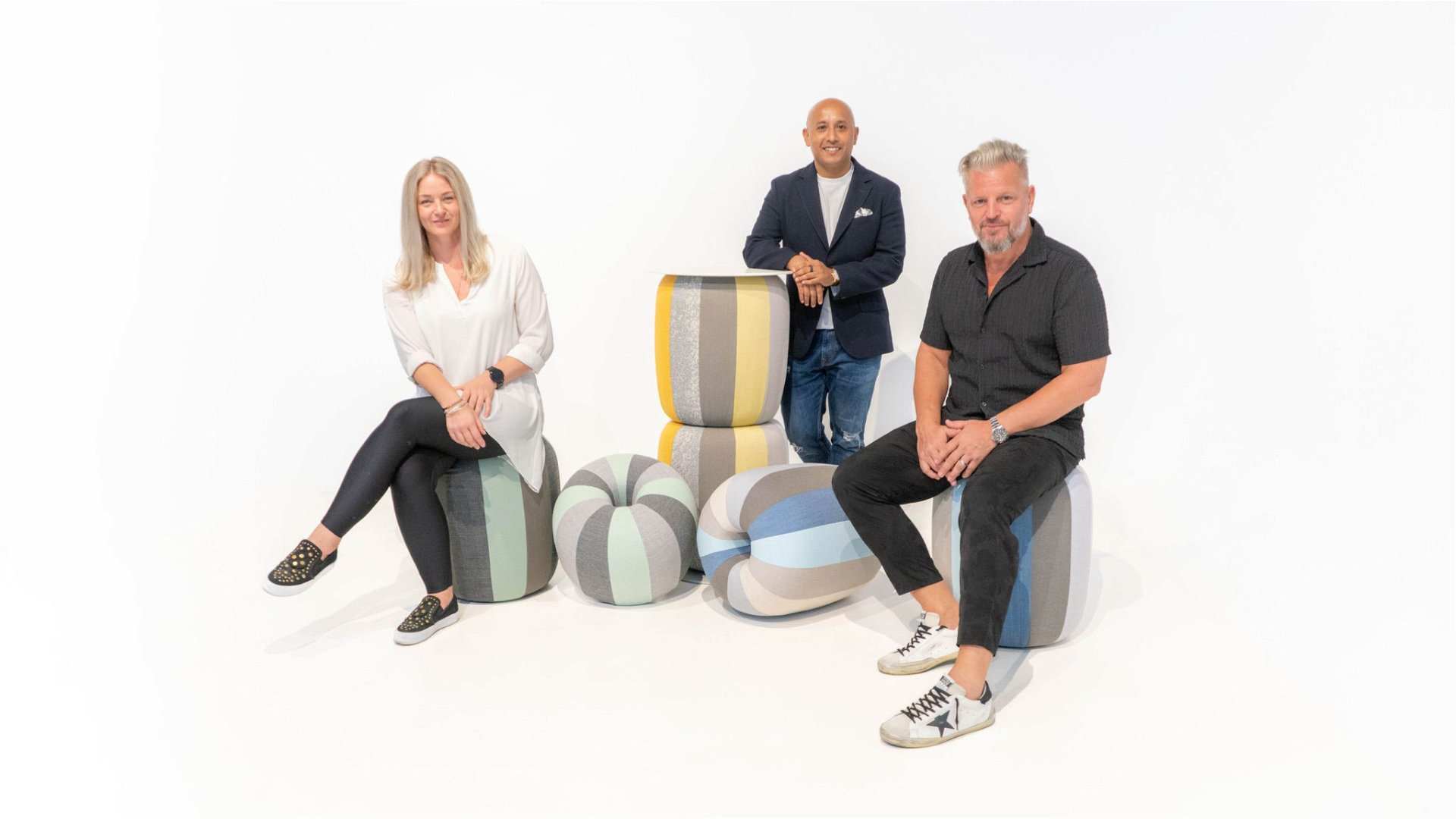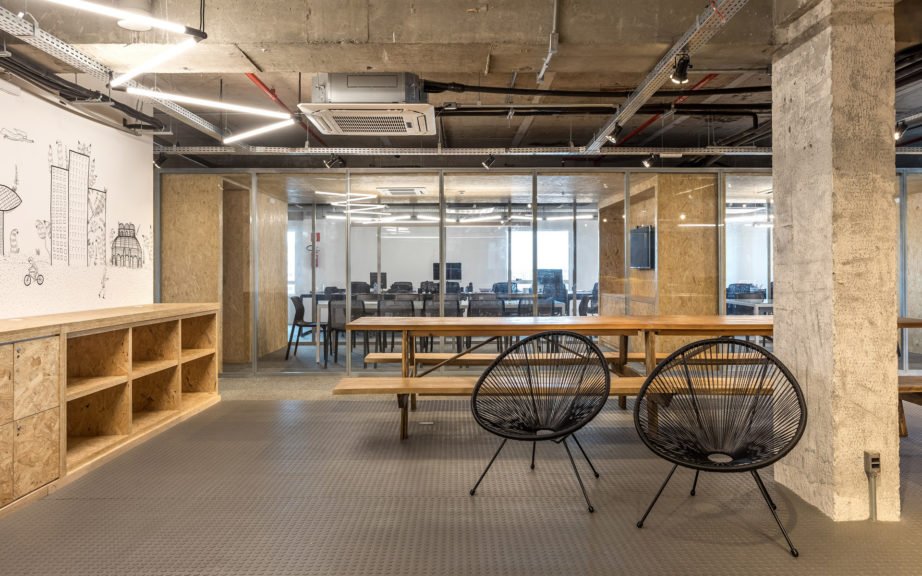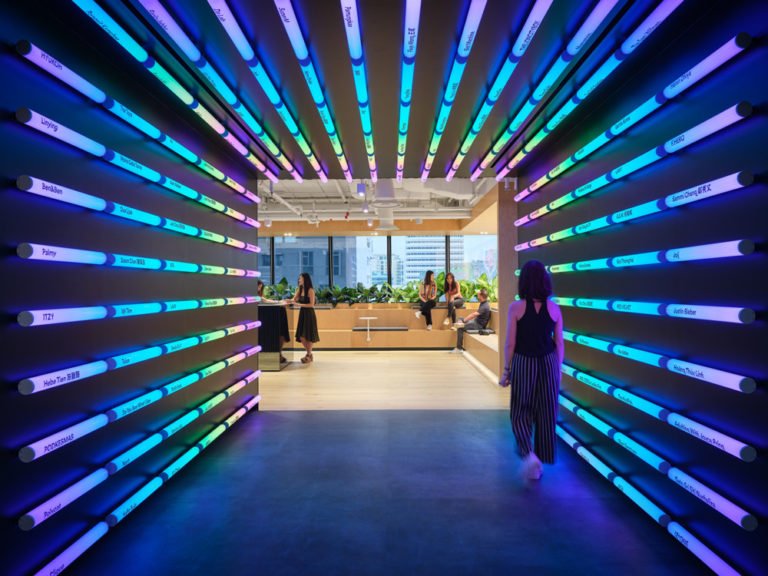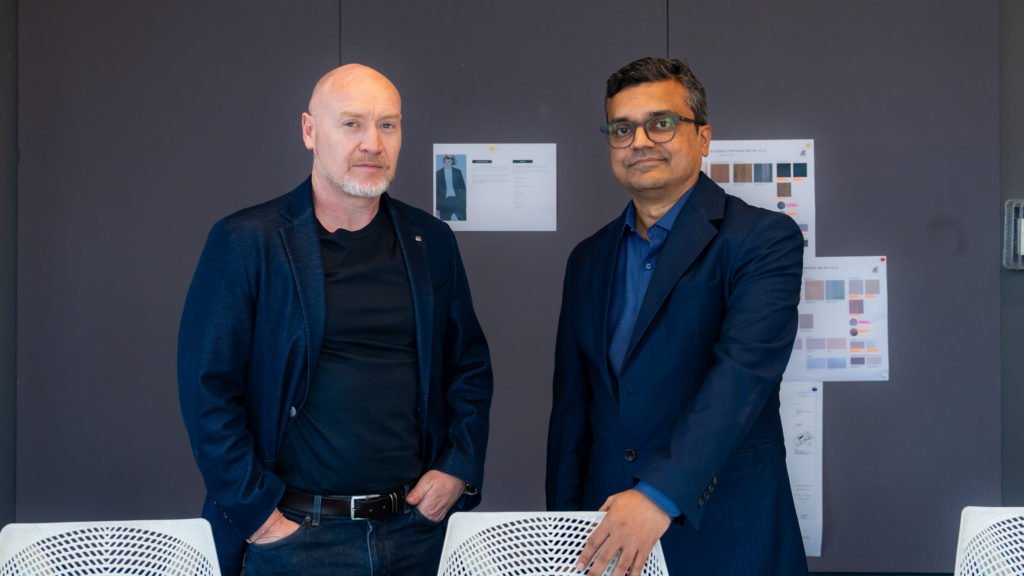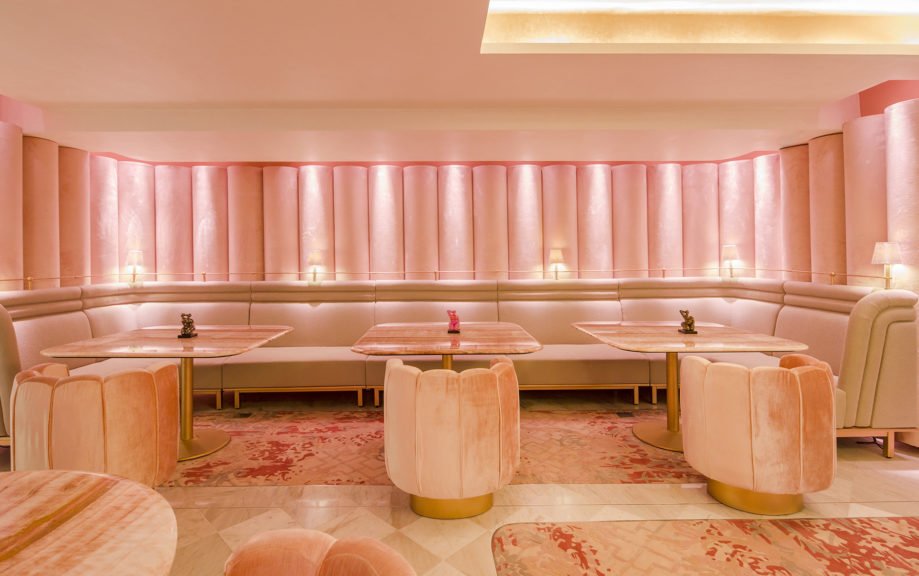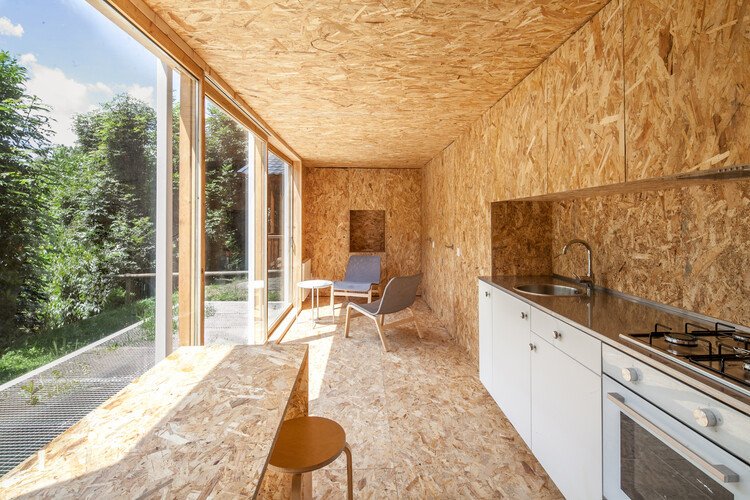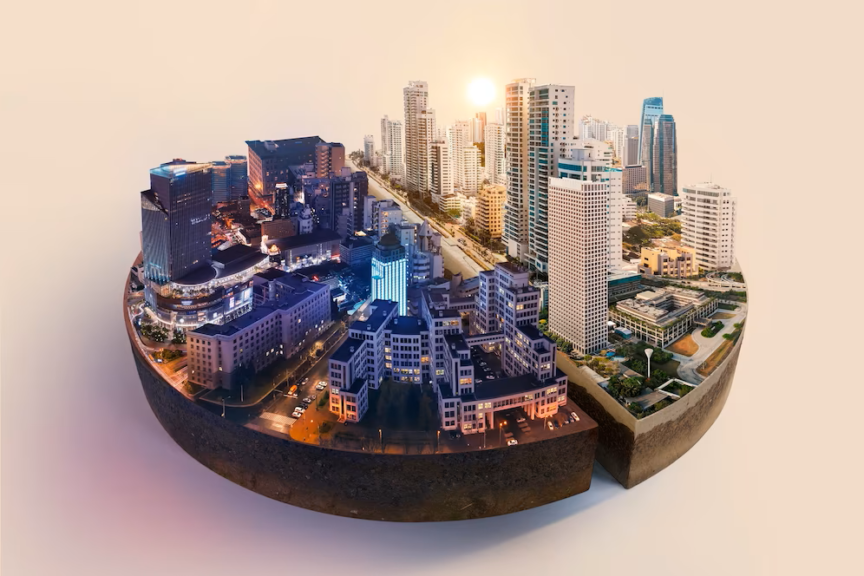Spearheading his own design studio, Rock Galpin, is a multi-faceted designer who has designed almost everything from chairs to bathroom accessories, and even prison furniture. STAK, the most recent addition to his portfolio, is an adaptive seating arrangement that requires no storage. The module comprises a table paired with pouffe stools, designed with a hollow structure that can be stacked onto the table’s leg. As a result, STAK exists in two distinct configurations – one as a cocktail table with the pouffes neatly stacked on its leg and the other as a breakout set-up featuring a low-height table and compatible pouffes.
However, what’s even more compelling than the product’s design is its production story. STAK uses local materials from the UAE and is backed by a team of discerning entities. The piece has three main stakeholders – Colab, Rock Galpin Studio and Kidzink. Leading acoustics and fabrics manufacturer, Kvadrat stands as the main material sponsor in the collaboration, while Neolith, The Good Plastic Company and ARDH Collective pitched in as contributing sponsors.
Representing all partners, Rock showcased STAK’s prototype at Dubai Design Week 2022 and arranged a friendly contest to showcase the swift stacking of pouffes onto the leg. To Rock’s pleasant surprise, a gentleman assembled the STAK module in a record-time of 15 seconds, outshining Rock’s own 16-second brisk pace!
Rock’s pride and delightful disposition is understandable. Especially when the journey of its production has been an atypical one….
The Genesis of STAK
It all started when Richard Wilson, Creative Director of Collab, confided in his designer friend, Rock. Collab is a social gathering space that needs to be shapeshifting – an area apt to view a presentation in one instance and be a happening environment that fosters budding industry relationships in the next. Furniture modules are key in the functioning of such a space – and storage was proving to be a pain point for Richard. Also, the time required to transform the purpose of a space was less than ideal.
With every feedback from Richard, the award-winning London-based designer’s creative side began concocting design schemes. On the contrary, Rock’s entrepreneurial alter-ego alerted him of a pragmatic barrier – neither Richard nor Rock were manufacturers with the right material or funding. While the concept of the product had potential, bringing it to reality would also require effort – especially with the six-month deadline they self-assigned to showcase it at Dubai Design Week 2022. But Rock and Richard were up for the challenge!
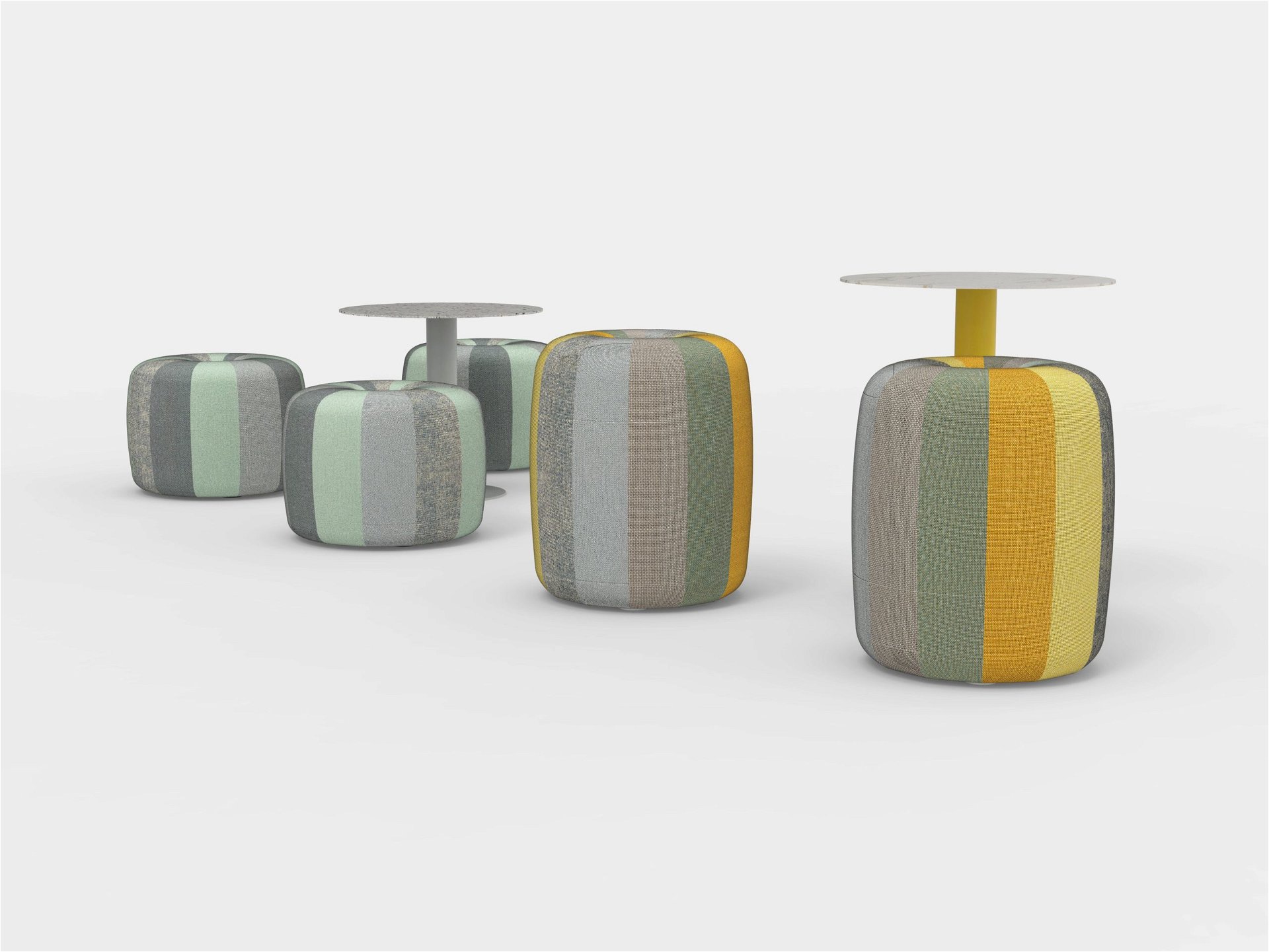
Soon enough, Rock presented the first sketch of STAK, and Richard was captivated; his enthusiasm knew no bounds. As Rock worked on the design, he realised that the product would require more than one more contributor.
The form of stools was made deliberately rotund to look appealing even when the table would be stacked. The sinuous form meant upholstery for the stool could employ strips; here, the designer saw the potential to engage cut-offs and ends of fabric rolls in manufacturing. To take its sustainability a notch further, Rock envisioned the table to be made of local materials to cut down on imports. With every development, it became clear that this was…
Not A One Man Show
Rock Galpin Studio has been in existence for over 30 years now. The studio’s origin traces back to London, and owing to its success, the design business also has a franchise in the city of all-encompassing glamour – Dubai. Certainly, for a studio as experienced as Rock’s, there have to be industry relations that could be counted on.
Every design studio Founder has two hats – that of a passionate designer and the other of a design entrepreneur. Rock put on the latter for a while to look for suitable collaborators who saw potential in the idea. Although more than one expressed interest in the concept, Kidzink took steps to display their confidence in the product. Kidzink is a manufacturer of educational furniture in the Middle East, and the idea of storage-saving modules and the playful nature of the product appealed to their vision of delivering innovative pieces.
To Kidzink’s founder, Charlotte Borghesi STAK was efficacious and visionary; and the collaboration with Rock Galpin Studio presented an opportunity to diversify her team’s product design repertoire and expertise. “As a design-led manufacturing company, we love to work with third party designers to bring new furniture ideas to life. STAK serves the needs of our clients in the education sector and many other sectors too. Many of our projects need flexible furniture and STAK’s ultimate strength is in its flexibility, it can do so many things!”, exclaimed Charlotte.
“They also loved the sustainability angle of it. They loved that we could manufacture it using local materials as much as possible. The fact that it would be all produced and supplied – all in the UAE, was a big selling point”, recalls Rock.
With the local manufacturer set, next Rock began looking for fabric suppliers to partner with. Kvadrat, with whom Rock Galpin Studio has undertaken more than a couple of projects, was Rock’s first choice, and as fate would have it, they were also extremely keen to partake in this project. Kvadrat supplied 20 ends of rolls and offcuts of fabric to Rock for STAK.
“At Kvadrat, we have a high focus on our sustainability agenda and with the launch of our ‘Really’ textile tabletop made of textile waste, we were looking for an opportunity to be part of Downtown Design 2022 to communicate about this new and innovative material. The collaboration with Rock Galpin and Colab provided a great platform to discuss sustainability and share our contribution”, expresses Gitte Nyhus Holm, Regional Director of Middle East & Africa, Kvadrat.
STAK’s aluminium frame and recyclable table tops were made using Polygood from The Good Plastic Company. The material employs reclaimed waste from refrigerators and computers. “Working on the STAK project was an exciting experience for us. We were able to showcase the potential of our surface material, Polygood, in a new and innovative way. STAK’s design is modern and visually appealing, which adds an element of style to its functionality”, says Alina Danilchenko, Special Projects Manager, The Good Plastic Company.
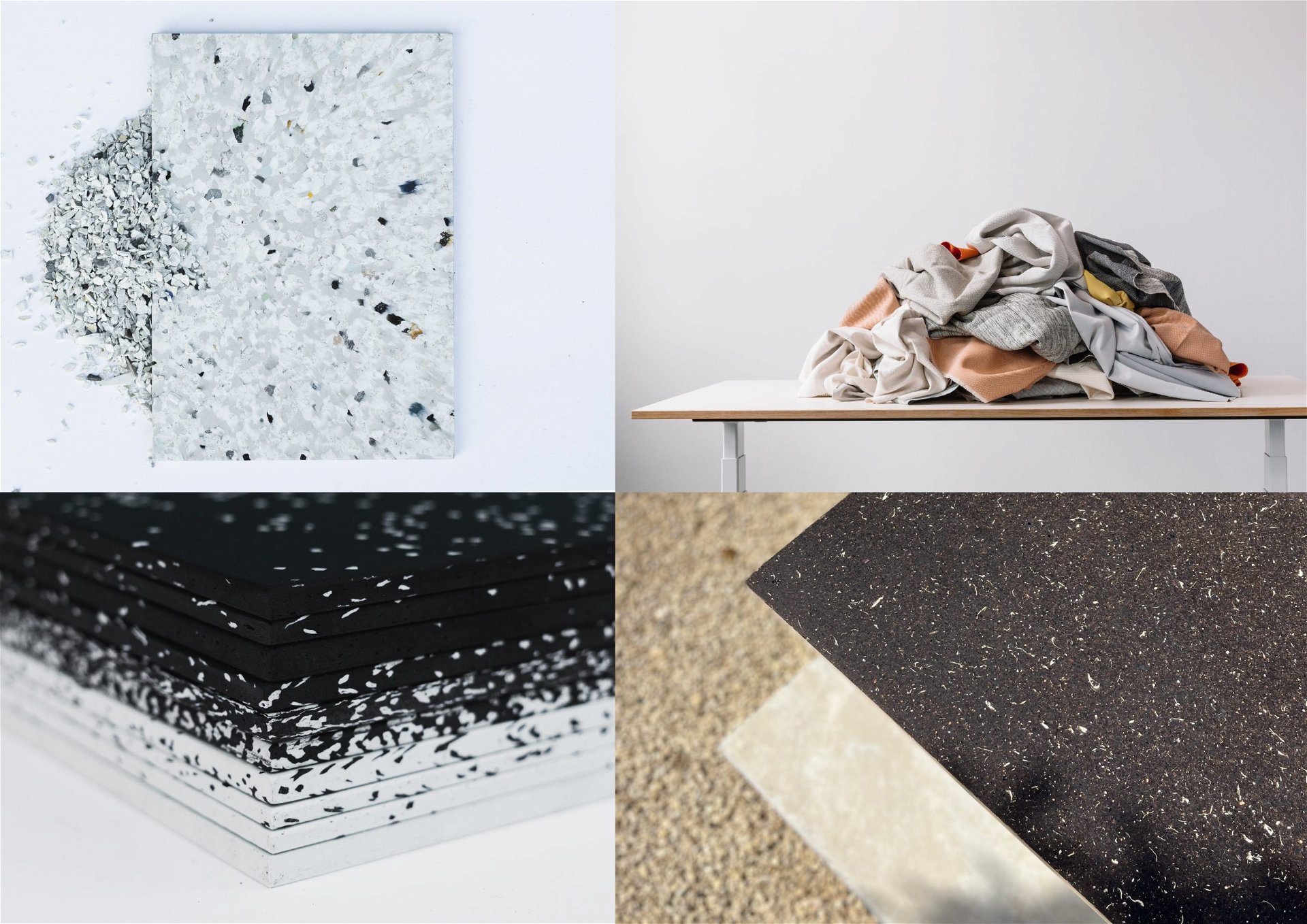
Other options in tabletop finishes came with Neolith’s sintered stone (a naturally-occurring, low-silicate and non-petroleum alternative to quartz) and ARDH Collective’s Dateform, a material derivative of date seed.
“For Neolith, the main point was that we could use the offcuts from the large format slabs to make the STAK table tops, minimising the wastage to the least minimum possible. Being the first carbon-neutral company in our industry, we are always looking to support innovative ways to accomplish sustainability”, avers Ali Maarawi, Managing Director, Middle East and Turkey, Neolith.
On the other hand, Nikhilesh Mohan, Co-Founder + ARDH Solutions Director, ARDH Collective, opines, “Our decision to participate in this collaboration was driven by our belief in the power of partnerships to create meaningful change. STAK is an excellent example of how creative minds from different fields can come together to develop innovative solutions that benefit people and the planet. It’s a testament to the ingenuity of the team behind STAK and their commitment to creating furniture that is not only beautiful but also functional and versatile. We were excited to contribute our sustainable material, ‘It’s Roasted’ date form.”
With the team players in place, Rock had completed half the battle. However, the remaining half presented its own set of distinctive obstacles…
Challenges in Production
Rock realises that he’s a stern taskmaster. He attributes perfectionism to his strong will and ‘I know exactly what I want’ ideology. “The production process was quite interesting. I continually asked myself, ‘How do we make the most of what they’re giving us?'”, he shares.
The Kvadrat cut-off fabrics were different types and colours, and strips of them had to be used to curate one unified cover. “That took a lot of art direction in terms of getting the colourways working really, really well. And some of them are quite challenging like the blue, but I think it worked out well,” mentions Rock.
The stacking capacity of pouffes on a single table is limited to a range of two to three – that meant each millimetre made a difference, and the error threshold was exceedingly narrow, requiring meticulous attention to detail. Different sizes of pouffes would accommodate a wide range of users (from children to adults) and also add variety to the overall design. The team also had to be mindful that the pouffes were light enough to be carried by the most petite of people.
The major challenge was developing the locking mechanism for the tabletop to enable passing the pouffes through the leg. It had to be simple but also something that required an unusual manoeuvre – so it wouldn’t be triggered when users were doing routine tasks. For example, the table shouldn’t disassemble when it’s picked from the top with the purpose of moving it. Hence, an intelligent locking mechanism was necessary. Conversely, the mechanism needed to be simple enough to facilitate quick accessing and retracting of the pouffes as required. The leg of the table also had to be collapsable and securely locked in a lowered position.
Rock adds, “Originally, I had this idea to pin all the components together, where you take the top piece of table leg out and remove it. Then you put the table top back again at a lower height. But I wasn’t satisfied because then there would be an extra piece. I wanted to try and make it all in one; no storage required. Here, the in-house design team at Kidzink were amazing. We collectively cracked it, and they did a great job of that.”
Leonardo Capradossi, Product ‘Koncept’ Developer for Kidzink testifies, “STAK was a brilliant concept right from the start. We enjoyed the process of working with Rock to tweak and resolve production challenges along the way. Eventually, by working collaboratively and using only high-quality materials, the team have been able to create something very special. We’re all so proud of STAK.”
Commendable efforts don’t always translate to foolproof victories. There’s an undeniable and daunting question in every team member’s mind while working on any product’s research and development process, ‘How will the public interact and react to it?’
Dubai Design Week 2022 was just six months away when Rock first started designing STAK, and it was a mere three months away when the production began. Team STAK had managed to pull off the unimaginable, but would it bear fruits? It all came down to a showdown at the Downtown Design during Dubai Design Week 2022 in a stall designed by Rock Galpin and built by Kidzink called STAK HUB….
STAK HUB, Identity Awards and a multitude of other applications
STAK HUB materialised as a booth allowing visitors at Downtown Design to grab a seat, work, chat, and interact with the piece. Along with the light-hearted contest mentioned at the beginning, it made for a busy booth. With plenty of visitors engaging with STAK, unthought-of ways to use the module came to light. A particularly comic one was when a woman passed her arm through one of the pouffes instead of carrying it the conventional way with two hands. What surprised Rock was the enquiries of STAK in residential projects – but that could be due to the event’s visitorship. Yet, it was notable because it sparked the idea of using the furniture as an outdoor piece. As this article is being written, team STAK is looking to provide a waterproof alternative to STAK’s original materials.
Shortly after, STAK was also used at the Identity Awards 2022 as cocktail tables. “Can you imagine how a space can change and how quickly?” exclaims Rock. “From a low-density space, like an informal networking event where the pouffes are being used as seats, to high-density evenings where they can become cocktail tables. If one table can be transformed in 15 seconds, it would take 4-5 mins for the staff to switch the setting of an entire premise.”
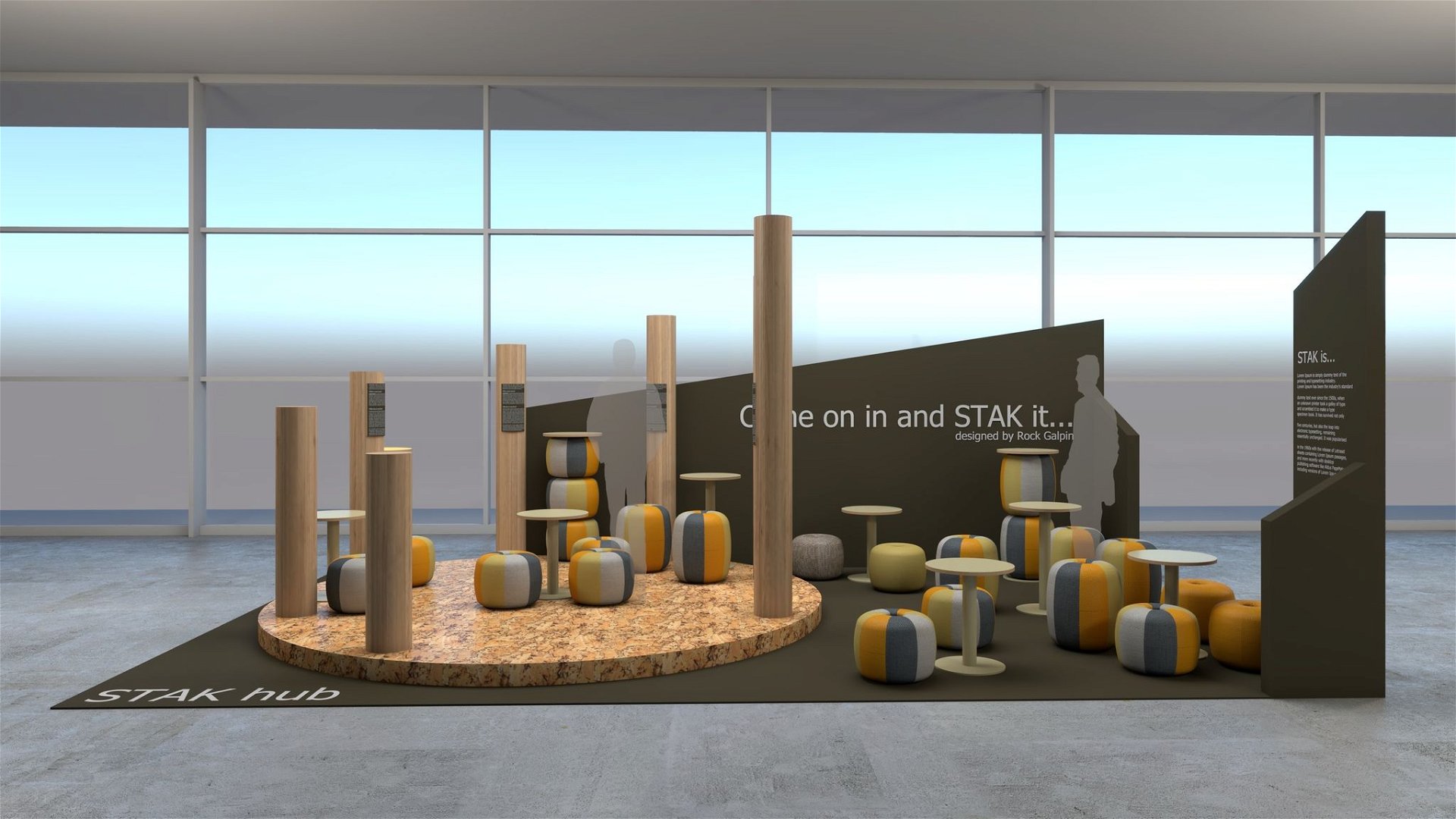
Since its launch, STAK has been specified in hospitality projects requiring quirkiness – even in spas and salons. Educational and breakout areas for corporate settings have been a close second. Rock is also looking to upgrade the product and further accelerate its applications.
The story of STAK – a product made from scratch in the UAE – is a testament to the timeless adage, ‘Where there is a will, there is a way.’ It is a powerful attestation to the resourcefulness and determination of its makers. While the recorded total imports of the United Arab Emirates reached 29.9 USD billion in September 2022, it is crucial to recognise that the impact of imports extends beyond mere financial costs. The detrimental environmental consequences resulting from transportation and fuel consumption cannot be overlooked. Moreover, there are instances where damaged products can only be repaired or replaced in the facility they were produced. Given such, it is crucial for UAE entrepreneurs to look inward when it comes to production or even specifying products. True sustainability extends beyond the use of sustainable materials; it exists in a circular approach – and STAK by Rock Galpin is an exemplary step in the right direction.
STAK was a part of the installations at INDEX Dubai 2023, check it out!
INDEX 2023 Premiers in Style: A Look at the Design Installations Inside
Article info
Article:
Date added:
23 May, 2023

